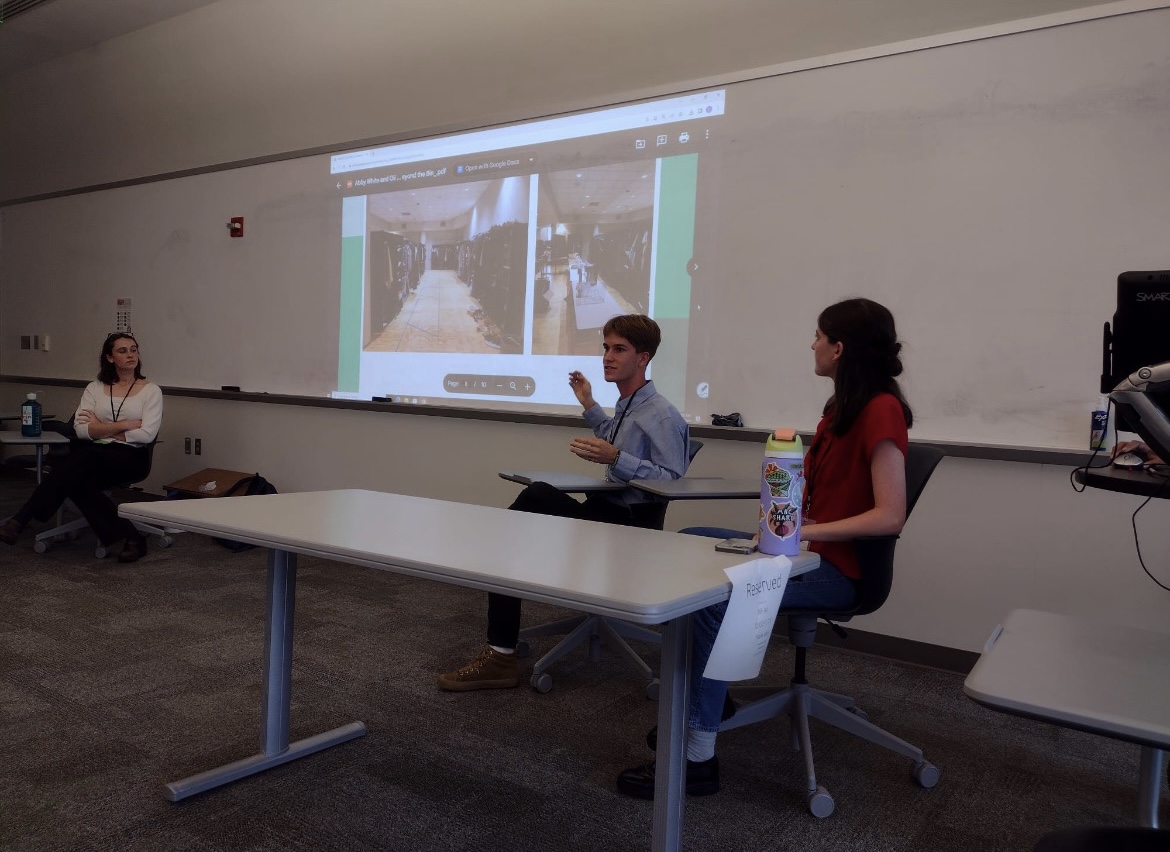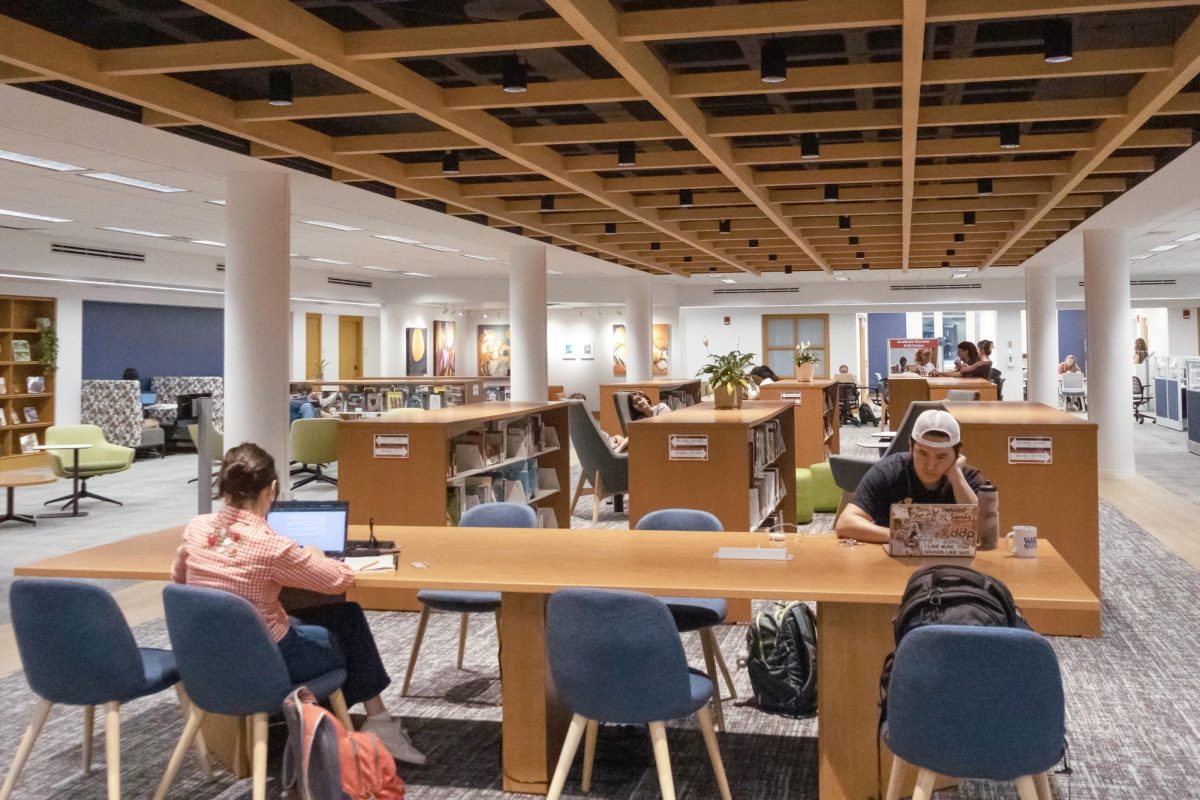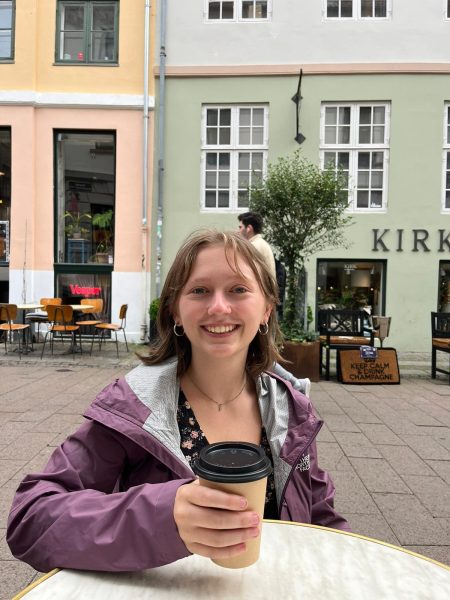Since its establishment in 2008, Macalester’s Sustainability Office has cultivated initiatives that strive towards eliminating waste at Macalester. From the Open Pantry, located at Campus Center 227, to the Free Swap, located behind the Sustainability Office at 1657 Lincoln Avenue, the requisite infrastructure is there.
As the Sustainability Office continues to reach for these goals, Sustainability Director Megan Butler says that part of the reason she took the job in Jan. 2023 was Macalester’s mission to continue innovating, whether through figuring out new ways to divert waste from landfills or striving towards environmental justice.
“The goal and the mission of the Macalester Sustainability Office to me reflected dissatisfaction in a good way – like we’re doing well, but we could do better,” Butler said.
Butler explains that there are three scales of goals the Sustainability Office works towards: institutional commitments regarding carbon neutrality and zero waste, things students are passionate about and staff passions about sustainability. Diverting waste and reaching towards equity within the realm of sustainability fit under all three categories.
Macalester recently won first place in the Waste Diversion Category in the National Wildlife Federation’s 2023 Campus Race to Zero Waste Case Study Competition due to their work diverting Macalester swag from landfills.
Additionally, Macalester’s Sustainability Office won an 18-month grant that will allow the Sustainability office to strengthen existing programs and expand in regard to food waste with the Open Pantry, a food pantry specifically for the Macalester community.
“Food insecurity is going up on college campuses; it’s going up in the Twin Cities. It seems like [food insecurity and food waste are] two issues that shouldn’t exist in the same place,” Butler said. “The goal of the grant is to capture food that otherwise could be used for human consumption and make sure it goes to human consumption instead of entering the waste.”
Macalester’s food waste diversion system involves diverting food waste from Cafe Mac to pig farms, composting and engaging in food recovery — right now, that means taking excess food from Cafe Mac on Sundays and storing it so that it can be used by food pantries in the community.
Macalester’s food recovery system already existed as a well-established program before Sustainability Office assistant Oliver Matus-Bond ’26 got involved, but the grant will allow the program to run even more efficiently and impact more people. According to the University of Minnesota Food Security Dashboard, Ramsey County’s food insecurity rate rests at 13% as of July 1, 2023 compared to the national average of 10.5%.
“A lot of people are food insecure, way more people than we think. They don’t have the ability to reach their nutritional needs,” Matus-Bond said. “So it’s important to create an even playing field. Waste isn’t just about waste.”
Matus-Bond, along with other sustainability workers, visited St. Catherine University’s open access pantry last spring, another facility working to combat food insecurity within the sphere of college campuses.
“[St. Catherine University] had really good facilities and it kind of gave us an idea for a grant in the future,” Matus-Bond said.
Last spring, Matus-Bond worked alongside Eureka Recycling to evaluate the waste produced by Macalester students, further cluing the Sustainability Office in to the pulse of the student body. He organized a survey of 15-first years who monitored their waste over a week-long period.
“[Eureka was] looking for colleges that could do individual surveys to fulfill quotas they have to reach as an organization,” Matus-Bond said. “[The students in the survey] looked at what they threw away everyday by item, not by weight, and then from there we can see how much compost, how much trash and how much recycling students who live in the dorms throw away.”
Both the Free Swap and 1550 Summit Avenue — which effectively works as an extension of the Free Swap — house items ranging from clothing to school supplies, which prevents material waste. Sustainability Office student worker Lorenna Graham ’26 says that part of working towards zero waste is ensuring that students know what resources are available.
“I wish more people knew about the Free Swap and 1550 because people don’t know that it’s there,” Graham said. “They don’t realize that the stuff is free [and] if people were to realize that they would take more advantage.”
Macalester’s original goals for zero waste and carbon neutrality, developed in the early 2000s, were zero waste by 2020 and carbon neutral by 2025. Butler explains that a team is currently working to revise those goals.
“We had different assumptions about what the world would look like in 2020. We have a better idea of what’s possible [now],” Butler said. “We’ve made a lot of really good progress. It’s like the last 15-20% of the goals. Low hanging fruit, we’ve gotten, and we’re really proud of it. How do we get to the next step? How do we innovate in a way that is unique and exciting and pushes things forward in a good way?”
One of the ways Macalester’s Sustainability Office currently innovates is through the Post Landfill Action Fellowship (PLAN) Atlas Zero Waste Project, Graham, Matus-Bond and sustainability office student worker Abby White ’26 are involved in. PLAN comes in and works with a plethora of different schools to get them to zero waste, which means that 90% of our waste is divested from the landfill or the incinerator—either reused, recycled, or composted.
“Essentially, we’re preparing a proposal for the school to get to zero waste,” Graham said. “So researching what we’re doing now and what we can do better and then we’re going to send it to the higher ups at the school for them to approve.”
The program involves three stages where “fellows are trained to perform holistic qualitative assessments, overcome campus silos and bureaucratic challenges and enact strategic visions that lay the groundwork for zero waste infrastructure on campus,” according to PLAN. Graham explained that Macalester already has effective infrastructure in place in regard to composting.
“Our signage and just accessibility of recycling and compost bins is something we excel at,” Graham said. “A lot of other schools don’t have standardized bin signage and it’s really good that we do.”
Graham explains that much of the work with the fellowship builds on existing work done in moving the campus closer to zero waste.
“We’ve already had plans in place for 2021 and 2022,” Graham said. “We’re basing it off of what’s already been done and looking at what we failed at and what we accomplished.
The Macalester Sustainability Office attended the Upper Midwest Association for Campus Sustainability Conference Sept. 22-23 where Matus Bond and White gave a presentation titled “Campus as a Living Laboratory”, describing ways in which Macalester diverts waste including through the Free Swap and 1550.
Attending the conference made Matus-Bond realize that administration doesn’t always understand what students need and how they think, so it’s important for students to have a hand in shaping the community landscape in regard to sustainability.
“It’s incredibly important as a student to take control of your environment and work towards initiatives you care about,” Matus-Bond said. “If there’s a change at Macalester that you want to see [in regard to sustainability] there’s support to make that happen.”












